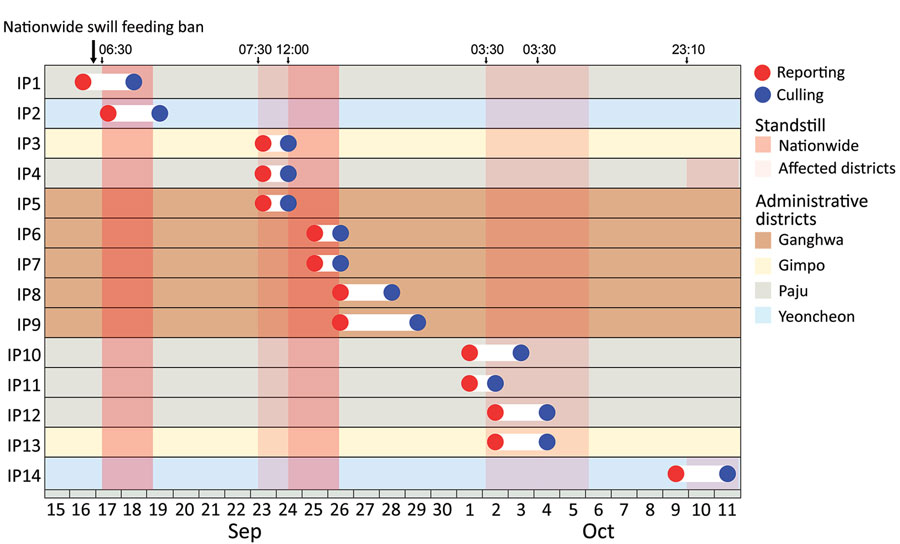Transmission Dynamics of African Swine Fever Virus, South Korea, 2019
Dae Sung Yoo
1, Younjung Kim
1
, Eune Sub Lee, Jun Sik Lim, Seong Keun Hong, Il Seob Lee, Chung Sik Jung, Ha Chung Yoon, Sung Hwan Wee, Dirk U. Pfeiffer, and Guillaume Fournié
Author affiliations: Animal and Plant Quarantine Agency, Gimcheon, South Korea (D.S. Yoo, E.S. Lee, S.K. Hong, I.S. Lee, C.S. Jung, H.C. Yoon, S.H. Wee); Jockey Club College of Veterinary Medicine and Life Sciences, City University of Hong Kong, Hong Kong, China (Y. Kim, D.U. Pfeiffer); Kangwon National University College of Veterinary Medicine, Chuncheon, South Korea (J.S. Lim); Royal Veterinary College, London, UK (D.U. Pfeiffer, G. Fournié)
Main Article
Figure 2

Figure 2. Timeline of reporting and culling of African swine fever virus IPs and control measures implemented during the African swine fever epidemic in South Korea, 2019. Reddish vertical shades represent movement restriction (standstill) imposed across the country (darker shades) or only in the affected municipalities (lighter shades). Numbers on the top represent the time when movement restriction was imposed. The colors of horizontal shades refer to IPs’ municipalities. IPs were numbered in the order of reporting dates. Over the course of the epidemic, six 48-hour standstill periods (bans on movements of livestock, persons, vehicles, and supplies to farms and slaughterhouses) were enforced across the country or in affected municipalities. IP, infected premises.
Main Article
Page created: May 14, 2021
Page updated: June 16, 2021
Page reviewed: June 16, 2021
The conclusions, findings, and opinions expressed by authors contributing to this journal do not necessarily reflect the official position of the U.S. Department of Health and Human Services, the Public Health Service, the Centers for Disease Control and Prevention, or the authors' affiliated institutions. Use of trade names is for identification only and does not imply endorsement by any of the groups named above.
